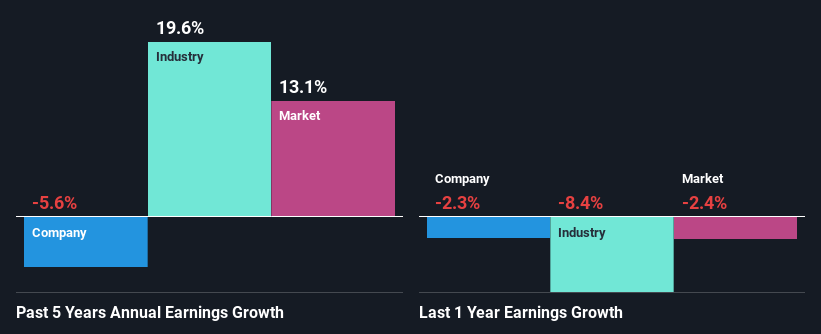- United States
- /
- Specialty Stores
- /
- NYSE:BBY
Has Best Buy Co., Inc.'s (NYSE:BBY) Impressive Stock Performance Got Anything to Do With Its Fundamentals?

Best Buy's (NYSE:BBY) stock is up by a considerable 15% over the past three months. Given that stock prices are usually aligned with a company's financial performance in the long-term, we decided to study its financial indicators more closely to see if they had a hand to play in the recent price move. Particularly, we will be paying attention to Best Buy's ROE today.
Return on equity or ROE is an important factor to be considered by a shareholder because it tells them how effectively their capital is being reinvested. In simpler terms, it measures the profitability of a company in relation to shareholder's equity.
View our latest analysis for Best Buy
How Do You Calculate Return On Equity?
The formula for return on equity is:
Return on Equity = Net Profit (from continuing operations) ÷ Shareholders' Equity
So, based on the above formula, the ROE for Best Buy is:
41% = US$1.3b ÷ US$3.1b (Based on the trailing twelve months to August 2024).
The 'return' is the yearly profit. That means that for every $1 worth of shareholders' equity, the company generated $0.41 in profit.
What Is The Relationship Between ROE And Earnings Growth?
We have already established that ROE serves as an efficient profit-generating gauge for a company's future earnings. Depending on how much of these profits the company reinvests or "retains", and how effectively it does so, we are then able to assess a company’s earnings growth potential. Assuming everything else remains unchanged, the higher the ROE and profit retention, the higher the growth rate of a company compared to companies that don't necessarily bear these characteristics.
Best Buy's Earnings Growth And 41% ROE
Firstly, we acknowledge that Best Buy has a significantly high ROE. Second, a comparison with the average ROE reported by the industry of 20% also doesn't go unnoticed by us. As you might expect, the 5.6% net income decline reported by Best Buy doesn't bode well with us. Based on this, we feel that there might be other reasons which haven't been discussed so far in this article that could be hampering the company's growth. For example, it could be that the company has a high payout ratio or the business has allocated capital poorly, for instance.
However, when we compared Best Buy's growth with the industry we found that while the company's earnings have been shrinking, the industry has seen an earnings growth of 20% in the same period. This is quite worrisome.

Earnings growth is an important metric to consider when valuing a stock. What investors need to determine next is if the expected earnings growth, or the lack of it, is already built into the share price. Doing so will help them establish if the stock's future looks promising or ominous. Has the market priced in the future outlook for BBY? You can find out in our latest intrinsic value infographic research report.
Is Best Buy Using Its Retained Earnings Effectively?
Best Buy's declining earnings is not surprising given how the company is spending most of its profits in paying dividends, judging by its three-year median payout ratio of 58% (or a retention ratio of 42%). With only a little being reinvested into the business, earnings growth would obviously be low or non-existent.
In addition, Best Buy has been paying dividends over a period of at least ten years suggesting that keeping up dividend payments is way more important to the management even if it comes at the cost of business growth. Our latest analyst data shows that the future payout ratio of the company over the next three years is expected to be approximately 49%. As a result, Best Buy's ROE is not expected to change by much either, which we inferred from the analyst estimate of 46% for future ROE.
Summary
On the whole, we do feel that Best Buy has some positive attributes. Yet, the low earnings growth is a bit concerning, especially given that the company has a high rate of return. Investors could have benefitted from the high ROE, had the company been reinvesting more of its earnings. As discussed earlier, the company is retaining a small portion of its profits. With that said, we studied the latest analyst forecasts and found that while the company has shrunk its earnings in the past, analysts expect its earnings to grow in the future. To know more about the company's future earnings growth forecasts take a look at this free report on analyst forecasts for the company to find out more.
Valuation is complex, but we're here to simplify it.
Discover if Best Buy might be undervalued or overvalued with our detailed analysis, featuring fair value estimates, potential risks, dividends, insider trades, and its financial condition.
Access Free AnalysisHave feedback on this article? Concerned about the content? Get in touch with us directly. Alternatively, email editorial-team (at) simplywallst.com.
This article by Simply Wall St is general in nature. We provide commentary based on historical data and analyst forecasts only using an unbiased methodology and our articles are not intended to be financial advice. It does not constitute a recommendation to buy or sell any stock, and does not take account of your objectives, or your financial situation. We aim to bring you long-term focused analysis driven by fundamental data. Note that our analysis may not factor in the latest price-sensitive company announcements or qualitative material. Simply Wall St has no position in any stocks mentioned.
About NYSE:BBY
Best Buy
Engages in the retail of technology products in the United States, Canada, and international.
Flawless balance sheet, undervalued and pays a dividend.

